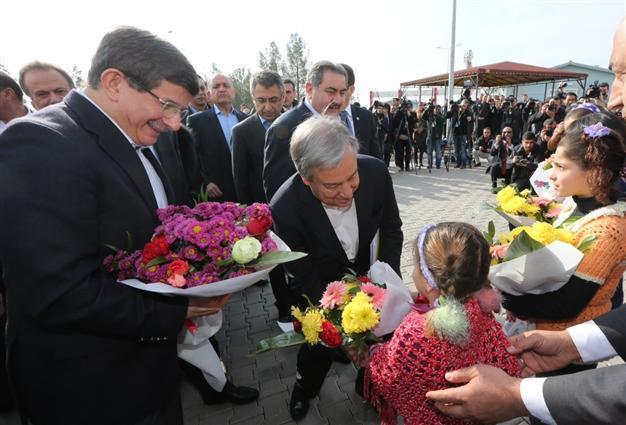World must share Syrian refugee burden, UNHCR chief says in Turkey
ŞANLIURFA – Hürriyet Daily News

Turkish Foreign Minister Ahmet Davutoğlu (L) and UN refugee chief Antonio Guterres visit a refugee camp in Harran, Şanlıurfa province, Jan 17. AA photo
The U.N. refugee agency’s chief and Syria’s neighbors, which are sheltering millions of refugees, have called on the international community to take the humanitarian aspect of the Arab republic’s crisis into account at the upcoming Geneva II peace conference.“Geneva II cannot be indifferent to the humanitarian dimension of the Syrian conflict and dramatic suffering of the Syrian people,” a final declaration of the second round of the Ministerial Meeting of Countries Bordering Syria in Şanlıurfa stated Jan. 17.
“It’s clear that there can be no military solution to the conflict. The solution must be political,” the representatives of the host countries and United Nations High Commissioner for Refugees (UNHCR) said.
The meeting was held in a refugee camp in the Harran district of the southeastern province of Şanlıurfa, with the participation of UNHCR High Commissioner Antonio Guterres, Foreign Minister Ahmet Davutoğlu, Iraqi Foreign Minister Hoshyar Zebari, Deputy Foreign Minister of Egypt Randa Habib Hassan, Jordanian International Cooperation and Planning Minister Ibrahim Saif and Lebanese Foreign Minister Adnan Mansour.
“We are appealing for all borders to be open to Syrians, not only the borders of neighboring countries. All borders need to be open to Syrian refugees. A true attitude of burden-sharing needs to be assumed by the international community,” Guterres said at the joint press conference.
Just six years ago Syria was the second largest hosting country in the world with more than 2 million refugees, Guterres said, while lamenting that it was now producing the most refugees in the world.
The international community needs to recognize and express gratitude and appreciation for the solidarity expressed by neighboring countries, he said, noting that about 3 million Syrians have left the country.
“They are hosting them, suffering a huge impact on their economies, in their societies, in their demography, in their security. Even with all those aspects, they have received, protected and assisted these refugees,” the U.N. official said.
The refugee camp in Şanlıurfa is a demonstration of how generous Turkey is in providing “the best possible conditions for refugees not only to see their needs, but their dignity being stored,” he said.
There is no humanitarian solution for the problem, but the solution is political, Guterres said, underlining the importance of sending a clear message to the international community before the Geneva II conference that it is “absolutely essential to stop this bloodshed and to find a political solution.”
It would be unacceptable to believe that responsibility toward Syrian refugees falls upon the neighboring countries of Syria alone, Guterres said, noting that this was a responsibility for international community.
The Syrian refugees and host countries need massive financial support to address the challenge, he said. He also called on the world for open-minded visa policies to allow Syrian refugees to come and find protection, as well as to enhance resettlement and humanitarıan readmission projects.
Syrian regime most responsible party: Davutoğlu
Davutoğlu, meanwhile, said the entity most responsible for the Syrian crisis was the Syrian government, along with the U.N. Security Council, which has not been able to take any single decision for the last three years.
The world community can hardly resolve the Syrian problem if some parties continue to pursue “small accounts” and remain indifferent to the crisis, Davutoğlu said.
At his opening speech of the conference, Davutoğlu said the Syrian government was using tactics like those seen in Middle Ages, such as killing people with starvation, adding that cities and districts had been besieged by the regime and that humanitarian aid had not been allowed in for months.
He also called on the international community to take action for the humanitarian needs of Syrian refugees.
“I am addressing the Syrian people; whatever they do, whoever remains silent, we won’t remain silent to your pain. We’ll continue to stay by you with our best. Our countries, cities, districts are open for you all the way,” the minister said.
Zebari said the Syrian crisis had proven that there was no military solution. Iraq has directly suffered from the spillover of the Syrian crisis, he said, noting his government’s fight against al-Qaeda-affiliated groups in Iraq. “We call on the Syrian government and Syrian opposition to take this opportunity without preconditions. Otherwise there will be no Geneva II,” Zebari said.
Extremism and sectarianism accompanying this crisis as poison, Zebari said, noting that every country in the region would be affected unless regional countries cooperate. “Some of the extremist groups have the upper hand. This is not to the benefit of Syria or for others,” he said, adding that groups such as al-Nusra or the Islamic State of Iraq and the Levant (ISIL) should not be in Syria.
The international community should act together against whoever oppresses the Syrian people, Davutoğlu said, naming them as the “regime” and al-Qaeda-affiliated groups. Turkey’s position is clear on this issue and it would assume its international responsibilities, he added.
Some 700,000 Syrians have sought shelter in Turkey, with nearly 215,000 of them living in 22 temporary protection centers in 10 provinces. Almost 500,000 refugees reside outside of camps. Over $2 billion have been spent by the Turkish government for their needs, while the international community has spent $150 million for Syrian refugees in Turkey.
















